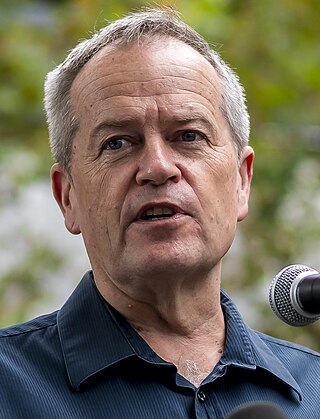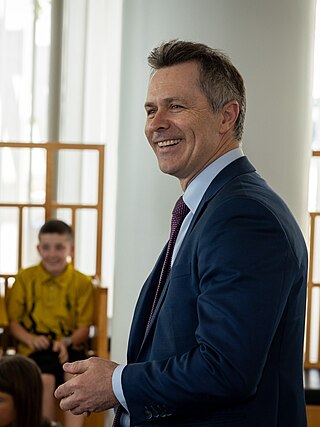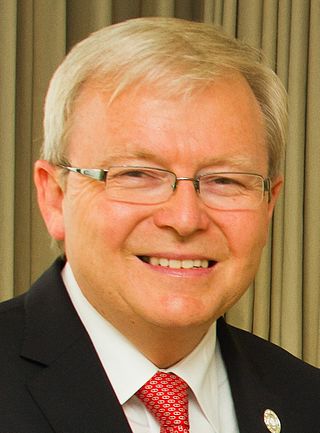
Anthony Norman Albanese is an Australian politician serving as the 31st and current prime minister of Australia since 2022. He has been the leader of the Labor Party (ALP) since 2019 and the member of parliament (MP) for the New South Wales division of Grayndler since 1996. Albanese previously served as the 15th deputy prime minister under the second Rudd government in 2013. He held various ministerial positions from 2007 to 2013 in the governments of Kevin Rudd and Julia Gillard.

In Australian federal politics, the Leader of His Majesty's Loyal Opposition, more commonly referred to as the Leader of the Opposition is an elected member of parliament (MP) in the Australian House of Representatives who leads the opposition. The Leader of the Opposition, by convention, is the leader of the largest political party in the House of Representatives that is not in government.

Brendan Patrick O'Connor is an Australian politician who served as Minister for Skills and Training from 2022 to 2024 in the Albanese ministry after having served in the same portfolio in 2013 in the Second Rudd ministry. He is a member of the Australian Labor Party (ALP) and has served in the House of Representatives since 2001. He held ministerial office in the governments of Kevin Rudd and Julia Gillard from 2007 to 2013, including as a member of cabinet from 2012 to 2013. He was a member of the shadow cabinet from 2013 to 2022.

Tanya Joan Plibersek is an Australian politician who served as Deputy Leader of the Labor Party and Deputy Leader of the Opposition from 2013 to 2019. She has served as the Member of Parliament (MP) for Sydney since 1998. A member of the Labor Party, Plibersek served as a Cabinet Minister in the Rudd, Gillard and Albanese governments. She is currently the Minister for the Environment and Water in the Albanese ministry since 2022, having previously served as the Shadow Minister for Education and Shadow Minister for Women between 2019 and 2022.

Penelope Ying-Yen Wong is an Australian politician who is serving as the current minister for Foreign Affairs and leader of the Government in the Senate in the Albanese government since 2022. A member of the Australian Labor Party (ALP), she has been a senator for South Australia since 2002. Wong previously served as minister for Climate Change and minister for Finance and Deregulation during the governments of Prime Ministers Kevin Rudd and Julia Gillard from 2007 until 2013.

Christopher Eyles Guy Bowen is an Australian politician who has been Minister for Climate Change and Energy in the Albanese government since June 2022. He is a member of the Australian Labor Party (ALP) and was first elected to parliament at the 2004 federal election. He held ministerial office in the Rudd and Gillard governments from 2007 to 2013.

The leader of the Australian Labor Party is the highest political office within the federal Australian Labor Party (ALP). Leaders of the party are chosen from among the sitting members of the parliamentary caucus either by members alone or with a vote of the party’s rank-and-file membership. The current leader of the Labor Party, since 2019, is Anthony Albanese, who has served as the prime minister of Australia since 2022. There have been 21 leaders since 1901 when Chris Watson was elected as the inaugural leader following the first federal election.

William Richard Shorten is an Australian politician and former trade unionist serving as the current Minister for Government Services and Minister for the National Disability Insurance Scheme since 2022. Previously, Shorten was leader of the opposition and leader of the Labor Party (ALP) from 2013 to 2019. A member of parliament (MP) for the division of Maribyrnong since 2007, Shorten also held several ministerial portfolios in the Gillard and Rudd governments from 2010 to 2013.

Richard Donald Marles is an Australian politician and lawyer serving as the 19th and current deputy prime minister of Australia and the Minister for Defence since May 2022. He has been the deputy leader of the Australian Labor Party (ALP) since 2019, having served as the member of Parliament (MP) for the division of Corio since 2007.

Jason Dean Clare is an Australian politician serving as Minister for Education since 1 June 2022. He is a member of the Australian Labor Party (ALP) and has represented the Division of Blaxland in Western Sydney since 2007.

A leadership spill in the Australian Labor Party, the party of government in the Parliament of Australia, was held on 27 February 2012 at 10 am AEDT, followed by a ballot. The Prime Minister, Julia Gillard, announced the spill at a press conference on 23 February 2012, following the resignation of the Minister for Foreign Affairs, Kevin Rudd, from his cabinet position after months of speculation that he intended to challenge Gillard for the leadership. Rudd announced his intention to seek the leadership at a press conference on 24 February.

A leadership spill in the Australian Labor Party, the party then forming the Government of Australia, took place on 26 June 2013 at 7:00pm AEST. Prime Minister Julia Gillard called a ballot for Leader and Deputy Leader of the Labor Party live on Sky News Australia at 4:00pm, following persistent leadership tensions. She stated that she would retire from politics if she lost the vote, while calling on any would-be challengers to pledge to do the same if they lost. In a press conference held shortly after Gillard's announcement, backbencher and former Prime Minister Kevin Rudd announced that he would challenge Gillard, whilst also pledging to step down if he did not win the vote. At the ALP caucus meeting, Rudd was elected Leader of the Labor Party, with the caucus voting 57–45 in his favour.

The second Rudd government was the federal executive Government of Australia led by Prime Minister Kevin Rudd of the Australian Labor Party. It commenced on 27 June 2013 and ceased on 18 September 2013. Rudd had previously served a term as Prime Minister from 2007 to 2010 and been replaced by his deputy Julia Gillard, following an internal party spill. Rudd regained the Labor Party leadership by successfully re-challenging Gillard in a June 2013 party spill. On 5 August, Rudd called an election for 7 September 2013, which resulted in the defeat of his government by the Liberal/National Coalition led by Opposition Leader Tony Abbott.

A leadership election was held in October 2013 to select Kevin Rudd's replacement as leader of the Australian Labor Party and Leader of the Opposition. Bill Shorten was elected party leader, and Tanya Plibersek was later confirmed as deputy leader.
The Shadow Ministry of Bill Shorten was the opposition Australian Labor Party shadow ministry from October 2013 to May 2019, opposing the Abbott government, Turnbull government and Morrison government.

James Edward Chalmers is an Australian politician. He has been Treasurer of Australia in the Albanese government since May 2022. He is a member of the Australian Labor Party (ALP) and has served as a member of parliament for the division of Rankin since 2013.
An election for the leadership of the New South Wales branch of the Australian Labor Party was held between 7 and 29 June 2019. The election was triggered by the resignation of Leader Michael Daley on 25 March 2019. The election was a combined vote by the party membership and the Labor members of the Parliament of New South Wales, with each component weighted equally. The party members were sent their ballots on 7 June and had until 21 June to return them, while the parliamentary caucus met on 29 June to cast their votes.
An election for the leadership of the New South Wales Labor Party was held in June 2021, following the resignation of leader Jodi McKay on 28 May 2021.

The Albanese ministry is the 73rd ministry of the Government of Australia. It is led by the country's 31st Prime Minister, Anthony Albanese. The Albanese ministry succeeded the second Morrison ministry, which resigned on 23 May 2022 following the federal election that took place on 21 May which saw Labor defeat Scott Morrison's Liberal–National Coalition.

A leadership election of the Liberal Party of Australia was held on 30 May 2022, following the defeat of the Scott Morrison government at the 2022 federal election and the resignation of Morrison as party leader. The newly elected leader would become Leader of the Opposition to the Labor Party government of Anthony Albanese. A separate leadership spill for the Liberal Party's Coalition partner National Party was also held on the same day.
















